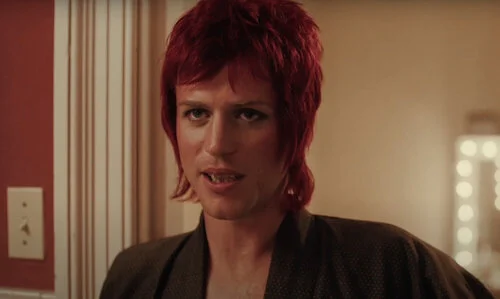Stardust: The Problem with Disapproved Biopics
Early reviews for Stardust have come out, and the response isn’t looking really good. Then, we have what the masses can go off of: the first promotional trailer. Since the get-go, Gabriel Range’s David Bowie biopic has hit roadblock after roadblock. Johnny Flynn’s casting has been divisive, which means some people are confident in what he can bring to the role; this is the high point of the collective responses since this thing has even been announced. That can’t be too good. Part of this disdain from the masses is how the Bowie estate has not approved Stardust for the usage of any of David Bowie’s music, so the film is relying on early covers the rock icon performed. Imagine Bohemian Rhapsody without the music of Queen; it would be even more pedestrian, and definitely much less worthwhile.
However, for me, I’m not so greatly concerned about the music side of things, although I am confident enough to go on record and say that David Bowie is one of my all time favourite musicians. I own every studio album of his (yes, even the bad ones). I wept like a baby and stayed up until five in the morning writing a eulogy when he passed away. Would I like Bowie’s music in a film that’s about his breakout? Absolutely. The music plays a big part in his mystique, especially when he became a rock n’ roll chameleon, whether that was mimicking styles (Young Americans and soul, Station to Station and funk, or even the jazzy route he took on his final album Blackstar) or taking on personas (the Thin White Duke, Halloween Jack, or, obviously, Ziggy Stardust). His gimmick was taking on new lives, and that’s mostly represented through his songs, no matter how elaborate his costumes and makeup became.
Stardust has met with overall disapproval since its early stages of production.
All of that matters, but that’s not the biggest problem with biopics that are disapproved by the topic themselves, or the estates of the departed. I’m talking about Jimi: All Is by My Side, Nina, and the like. Not having the essences of the persons being celebrated feels soulless, especially when so many pieces of information have to change; it starts with the music (or whatever else that person was known for, but music is usually the main focus for musical biopics, given rights issues that can be attached), and ends up being channeled in the changing of names and other altered facts (which would have occurred anyway, because screenwriters prioritize storytelling over accuracy).
But that’s still not the biggest problem. I’ll stop rambling. The biggest problem is that the going-ahead of these films is a clear indication of the problematic intentions of making these works in the first place. If a studio, filmmaker, producer — and whoever else — actually cared about creating a tribute to these subjects, they’d maybe call off the project, or figure out a way to come to an agreement with estates or the subjects themselves. Instead, the films get pushed through, willingly being made without any life. This is a clear indication of greed. If the higher ups on a film are content with the many absences in a film about a particular subject, then they really didn’t care about the subject to begin with; rather, they were interested with what money could be made off of said names. It’s like reading an essay with all of the arguments ripped out, and the thesis is slapped in the middle somewhere: you’re left with a waste of time that pretends to carry weight. All I personally have to go off of is the Stardust trailer, but even then the footage I see — no matter how it’s pieced together — feels like a lazier Rocketman, ground down to nothingness. Maybe there’s something neat about the road film aspects of Stardust, but otherwise I see a by-the-numbers biopic that doesn’t even have all of the numbers (there’s a musical number pun in there somewhere, too). Stardust could have become a more complex film about this touring relationship between Bowie and his publicist Ron Oberman, but early reviews have clarified that the film clearly didn’t go this route. All I can say is “here we go again”.
Andreas Babiolakis has a Masters degree in Film and Photography Preservation and Collections Management from Ryerson University, as well as a Bachelors degree in Cinema Studies from York University. His favourite times of year are the Criterion Collection flash sales and the annual Toronto International Film Festival.




